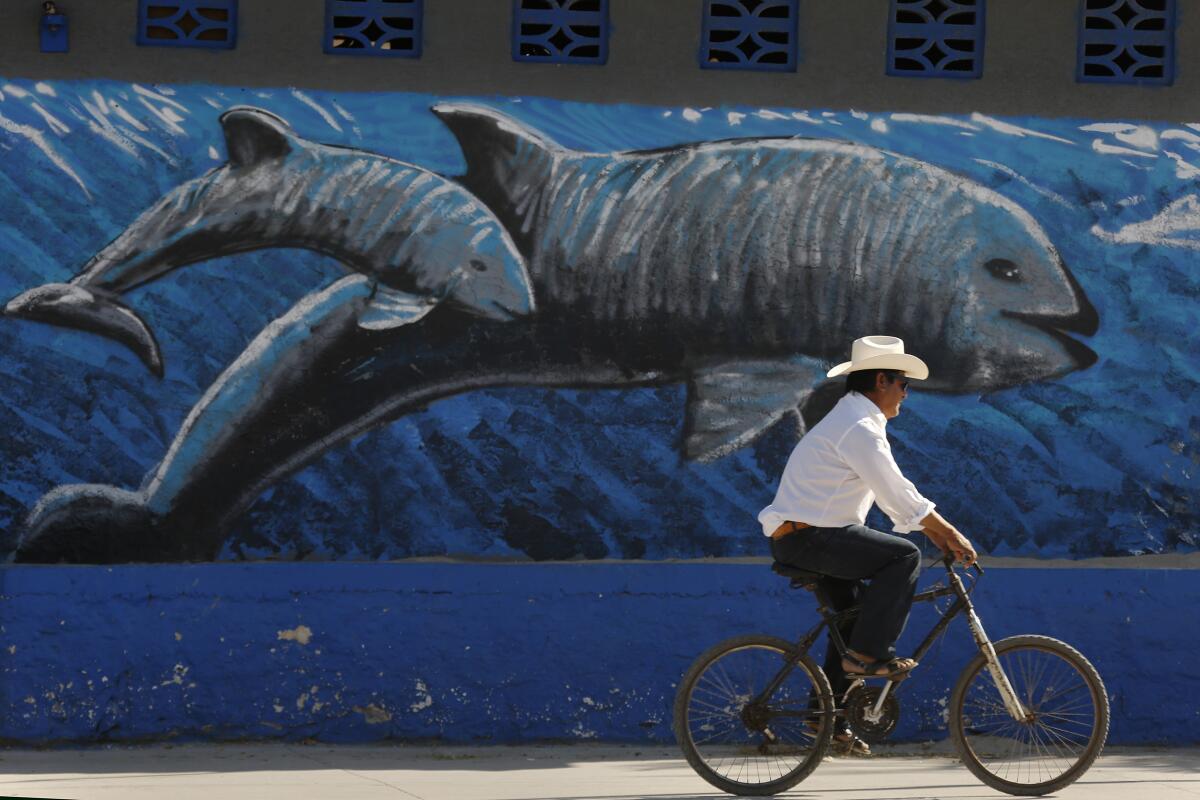The nearly hopeless case of the world’s smallest cetacean

- Share via
A decade ago, only about 250 vaquita porpoises still swam in the waters at the northern end of Mexico’s Gulf of California, their only habitat. How things have changed in a short time.
Be forewarned: You’re not about to get a heartwarming species success story. Scientists estimate that 10 vaquitas remain; most of the rest have been the collateral damage caused by a lively and illegal trade in the swim bladders of the totoaba, a large fish in the same area.
Attempts at captive breeding and relocation of the vaquita — the smallest cetacean in the world at about 4½ feet, with markings around the mouth that look like a black clown smile — have failed. Its best hope was the Mexican government’s “zero tolerance” ban on fishing in the 96-square-mile zone where the porpoises’ activities are concentrated, if you can call the presence of 10 porpoises “concentrated” in anything larger than a good-sized swimming pool. And now the Mexican government is backing away from that ban with a series of complicated and less-stringent sliding-scale rules that will be even harder to enforce.
The story of the vaquita is a complicated one, entwined with the popularity of prohibited — and prohibitively expensive — Chinese delicacies, Mexican drug cartels and stymied attempts at large-scale aquaculture. The future of the vaquita hasn’t looked good in years; with the Mexican government’s new policy, it appears all but hopeless.
The Chinese have valued the swim bladder of fish for centuries as an ingredient in soup and as a purported fertility enhancer. But how did the bladder of a fish that swims only in the Gulf of California become a sought-after Asian commodity? No one is certain, but the leading theory is that as yellow croaker, the preferred fish for swim bladders in China, were dying out from overfishing, attention turned to the totoaba because of its giant-sized bladder. The fish grows to about 6 feet, larger than the vaquita.
As with other contraband items craved by the vast market in China, the totoaba’s swim bladder has become a symbol of prestige, a way for people to show their wealth. It is often given as an extravagant gift. So even though the fish itself is listed as a critically endangered species, the black market for it thrives. Depending on the demand, the dried swim bladder rivals and even surpasses the price of cocaine per ounce — the reason that drug cartels have diversified their business by smuggling totoaba. And the gill nets used to catch ever more totoaba have trapped and drowned the vaquita.
The problem is similar to that of the drug market in the United States. Americans blame Mexico for the drug trade; Mexico blames the American demand for illicit drugs for creating the market in the first place. China and Mexico have engaged in the same kind of rhetoric over the totoaba.
Chinese enforcement has grown more stringent in recent years, wildlife advocates say. In 2018, officials there broke up a totoaba smuggling syndicate, seizing nearly 1,000 pounds of dried swim bladder valued at $26 million. But by the time the illicit goods are seized, the damage to the totoaba has been done. And as long as the demand is there — along with high prices — smugglers will take risks to meet it.
There is an avenue of hope: Unlike the vaquita, totoaba take to captive breeding, and with concentrated international effort, it might be possible to save both the imperiled fish and the porpoise. Several operations already are underway; at least one of them is growing totoaba in offshore pens as well as releasing juvenile fish into the wild, away from the vaquitas’ territory.
Obstacles remain. It takes up to 10 years for the fish to reach their full size, and there is not a minute to waste in protecting the vaquita. In addition, totoaba can be sold only in Mexico for now because the Convention on International Trade in Endangered Species has not given its blessing for global sales.
A major concern has been how difficult enforcement may become once farmed totoaba are introduced. Right now, authorities know that any totoaba swim bladders they find were illegally obtained; it would be more complicated if there were sustainably raised bladders alongside contraband. Genetic markers could solve that problem, but some wildlife groups also worry that if more totoaba becomes available, it could just grow the demand.
Even if member nations of CITES threaten sanctions, though, it’s not realistic to expect the Mexican government to maintain tight, 24/7 patrols on the vaquita reserve for the foreseeable future. It hasn’t even maintained that kind of presence in recent years when it said it would. The job is made more difficult by the cartels; violence against patrol boats operated by the nonprofit organization Sea Shepherd has included Molotov cocktails being thrown by attackers in a fleet of small boats.
Farming totoaba, and allowing international sale, looks like the best hope for both endangered species. It would provide a lucrative new industry for Mexico, and glutting the market should drive prices of totoaba down to the point where illegal gill netting no longer is worthwhile.
But in the years until fish farms can produce enough mature totoaba for the market, Mexico will need the international community’s aid in enforcing a zero-tolerance ban on fishing in the vaquita reserve. This would require well-equipped boats and plenty of staffing — as well as Mexico’s willingness to fully prosecute violators — and temporary compensation for fishermen, enough to make the further endangerment of this small porpoise, teetering on the edge of disappearance, not worth the risk.
More to Read
A cure for the common opinion
Get thought-provoking perspectives with our weekly newsletter.
You may occasionally receive promotional content from the Los Angeles Times.









